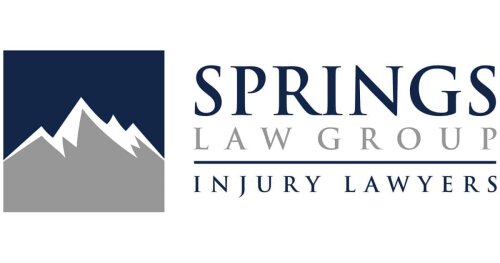Best Toxic Tort Lawyers in Colorado
Share your needs with us, get contacted by law firms.
Free. Takes 2 min.
Or refine your search by selecting a city:
List of the best lawyers in Colorado, United States

About Toxic Tort Law in Colorado, United States
Toxic tort law in Colorado deals with injuries or illnesses that result from exposure to hazardous substances such as chemicals, pesticides, pharmaceuticals, mold, or other toxins. These exposures can occur in the workplace, at home, or through consumer products and environmental contamination. Victims may suffer from a range of health issues, including respiratory problems, cancer, skin conditions, neurological disorders, or reproductive harm. Toxic tort cases are a specialized area of personal injury law and often require scientific and medical expertise to establish a link between exposure and injury.
Why You May Need a Lawyer
Individuals may require legal assistance in toxic tort cases for several reasons. If you have been exposed to harmful substances at your workplace, residence, or through the use of certain products and have suffered health consequences, navigating the legal and scientific complexities of these cases can be overwhelming. Employers, manufacturers, and property owners may deny responsibility or challenge your claims. Additionally, toxic tort cases often involve large corporations or insurance companies with significant resources. A lawyer experienced in toxic tort law can help you gather necessary evidence, identify liable parties, work with expert witnesses, and ensure your claim meets procedural deadlines and requirements.
Local Laws Overview
Colorado law recognizes the right of individuals to seek compensation for injuries caused by toxins or hazardous substances. To succeed in a toxic tort claim, plaintiffs must generally prove that a dangerous substance caused measurable harm and that one or more parties (such as manufacturers, employers, or property owners) are legally responsible. Colorado’s statutes of limitations set strict deadlines for filing these lawsuits, usually within two or three years from the date the injury is discovered or should have been discovered. The state follows modified comparative negligence principles, meaning any compensation can be reduced by a plaintiff’s degree of fault. Colorado also has specific environmental regulations governing the use, disposal, and cleanup of hazardous substances, which can impact liability in toxic tort cases.
Frequently Asked Questions
What is a toxic tort?
A toxic tort is a legal claim for harm or injury resulting from exposure to dangerous chemicals or substances. This includes exposure at work, in residential buildings, through contaminated water or air, and from defective consumer products.
Who can file a toxic tort claim in Colorado?
Anyone who has suffered injuries or illnesses due to exposure to a harmful substance may file a toxic tort claim. This includes employees, residents, consumers, or bystanders who can establish a link between exposure and harm.
What are common examples of toxic tort cases?
Common examples include exposure to asbestos, pesticides, mold, lead paint, industrial solvents, pharmaceuticals with dangerous side effects, and contaminated groundwater or soil.
How do I prove my toxic tort case?
Plaintiffs must demonstrate that they were exposed to a hazardous substance, that this exposure caused their injuries, and that the defendant is legally responsible. This often requires expert testimony from medical and scientific professionals.
What is the statute of limitations for toxic tort cases in Colorado?
Generally, you must file a toxic tort claim within two or three years of discovering your injury or when you should have reasonably discovered it. There are exceptions, so it is important to consult an attorney as soon as possible.
Can multiple people join together for a toxic tort lawsuit?
Yes, toxic tort cases are sometimes handled as class action lawsuits or multi-district litigation when multiple individuals are affected by the same source of exposure.
What compensation can I recover in a toxic tort case?
Victims may be eligible to recover compensation for medical expenses, lost income, pain and suffering, loss of quality of life, and, in some cases, punitive damages.
Who can be held liable for toxic tort injuries?
Defendants may include employers, property owners, landlords, manufacturers of chemicals or products, and other entities responsible for causing or failing to prevent toxic exposures.
Do I need to prove intent or negligence in a toxic tort case?
Most toxic tort cases are based on negligence or strict liability. Plaintiffs generally must show that the defendant failed to exercise reasonable care or that the product or substance was unreasonably dangerous.
How much does it cost to hire a toxic tort lawyer?
Many toxic tort attorneys work on a contingency fee basis, meaning they only get paid if you win your case. It is important to discuss fees and costs in your initial consultation.
Additional Resources
For additional information or assistance regarding toxic tort issues in Colorado, consider the following resources: - Colorado Department of Public Health and Environment (CDPHE) for information about hazardous substances and health guidelines - United States Environmental Protection Agency (EPA), Region 8 for regional environmental enforcement and assistance - Occupational Safety and Health Administration (OSHA) for workplace exposure concerns - Colorado Bar Association for lawyer referrals and legal information - Local legal aid organizations and nonprofit advocacy groups focused on environmental and public health
Next Steps
If you believe you may have a toxic tort claim, begin by documenting your symptoms, any exposure sources, and medical treatment received. Gather relevant records, such as property reports or workplace information. Next, schedule a consultation with an experienced Colorado toxic tort attorney, who can review your case, explain your legal options, and help you navigate the required steps. Acting quickly is vital because of legal deadlines and to preserve evidence. Do not hesitate to reach out for legal advice, as early action can improve your chances of a successful outcome.
Lawzana helps you find the best lawyers and law firms in Colorado through a curated and pre-screened list of qualified legal professionals. Our platform offers rankings and detailed profiles of attorneys and law firms, allowing you to compare based on practice areas, including Toxic Tort, experience, and client feedback.
Each profile includes a description of the firm's areas of practice, client reviews, team members and partners, year of establishment, spoken languages, office locations, contact information, social media presence, and any published articles or resources. Most firms on our platform speak English and are experienced in both local and international legal matters.
Get a quote from top-rated law firms in Colorado, United States — quickly, securely, and without unnecessary hassle.
Disclaimer:
The information provided on this page is for general informational purposes only and does not constitute legal advice. While we strive to ensure the accuracy and relevance of the content, legal information may change over time, and interpretations of the law can vary. You should always consult with a qualified legal professional for advice specific to your situation.
We disclaim all liability for actions taken or not taken based on the content of this page. If you believe any information is incorrect or outdated, please contact us, and we will review and update it where appropriate.
Browse toxic tort law firms by city in Colorado
Refine your search by selecting a city.










